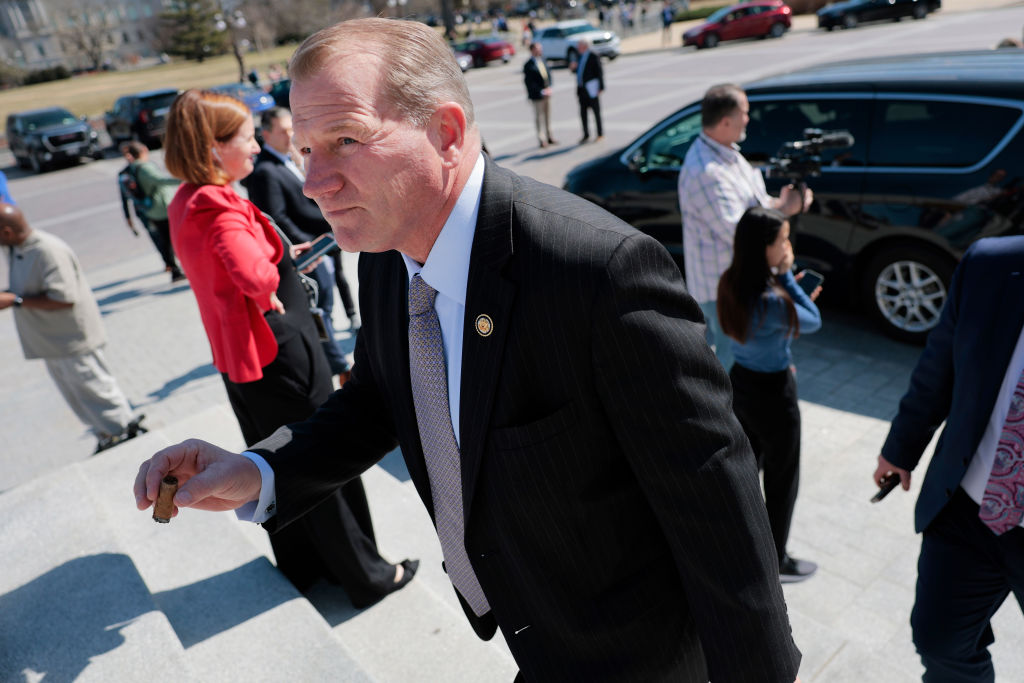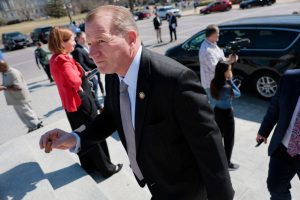
Republican Rep. Troy Nehls’ political persona is built on his tenure as sheriff of Fort Bend County, Texas, and his commitment in Washington to “law and order.”
But it appears Nehls is violating a federal transparency law by failing to publicly disclose his personal finances — a requirement of every member of Congress.
On May 13, Nehls requested a 90-day extension for filing his annual financial disclosure report. The House Ethics Committee granted his request, noting that his disclosure “must be filed on or before Aug. 13.” But as of today, Nehls’ report does not appear in the House of Representatives’ financial disclosure database.
Nehls’ congressional office did not respond to several messages left by phone and email. Representatives for the Ethics Committee also did not respond to an inquiry.
Maggie Westerman of the Office of the Clerk of the House, which processes federal lawmakers’ financial disclosure reports, said in an email to OpenSecrets that “all successfully filed electronic reports are posted to the Clerk’s website the next business day.” Asked about Nehls’ report, specifically, she referred questions back to the congressman’s office and the Ethics Committee.
The Stop Trading on Congressional Knowledge Act states that late filers are subject to a $200 penalty for first-time offenses. The Ethics Committee may, however, waive such a fine at its discretion and it is not required to make those decisions public.
Nehls’ apparent STOCK Act violation puts him in similar company with a number of fellow Republicans who have each violated the act with improper financial disclosures this year, including: Sen. Markwayne Mullin and Reps. Dan Meuser, Lisa McClain, Austin Scott, Neal Dunn, Scott Franklin, Brandon Gill and Tim Moore.
Democratic Reps. Debbie Wasserman Schultz, Dwight Evans, Jamie Raskin, Chellie Pingree, Shri Thanedar, George Whitesides, Ritchie Torres and Jonathan Jackson have likewise violated the act’s disclosure provisions this year.
Dozens of other lawmakers have violated the STOCK Act in recent years.
Rep. Anna Paulina Luna (R-Fla.) is leading a procedural effort to force a vote on legislation that would ban members of Congress from trading stocks. House leaders have pushed back against the bill, but President Donald Trump lent his support on Monday. Relatedly, a bipartisan coalition of lawmakers in both the House and Senate have this session been pressing a congressional stock-trade ban and stronger penalties for financial disclosure violations.
At present, members of Congress “know that, at most, they’re going to get a slap on the wrist,” said Aaron Scherb, a long-time congressional ethics watchdog. “When members don’t file disclosures on time, voters are left in the dark about potential conflicts of interest a member may have.”
The public also won’t know about how federal lawmakers might be earning money beyond their congressional salary of $174,000, either through personal financial investments or outside work.
While members of Congress are, by law, strictly limited in how much money they can make from outside jobs, such as teaching college courses, they may receive unlimited amounts of money from a most literary source: book writing.
In 2022, Nehls wrote “The Big Fraud: What Democrats Don’t Want You to Know about January 6, the 2020 Election, and a Whole Lot Else.” Trump declared the book, published by conservative imprint Bombardier Books, “A must read for all Americans.”
But since becoming a House member in 2021, Nehls has filed three annual financial disclosure reports, but none of them include the required book publishing agreement or income that he’s earned from his book.
Nehls’ has faced other scrutiny of his personal and political finances during his three terms in office.
In late 2023, the independent Office of Congressional Ethics, now known as the Office of Congressional Conduct, found probable cause that Nehls improperly used campaign money for his personal benefit. This prompted an investigation by the Ethics Committee, but the panel’s results have not yet been made public. Nehls has denied wrongdoing.
“My books remain open, and I am cooperating with the legitimate House Committee on Ethics,” Nehls said at the time.
Meanwhile, in 2022, a thief stole $157,626 from Nehls’ campaign account, although the congressman indicated to the Federal Election Commission that his campaign has recouped most of the money.
Nehls easily won his suburban Houston and Texas Gulf Coast congressional district in 2024, defeating his Democratic challenger by about 24 percentage points.
Dave Levinthal is a Washington, D.C.-based investigative journalist. He served as OpenSecrets’ editorial and communications director from 2009 to 2011.














